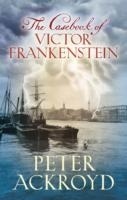The Casebook of Victor Frankenstein

Editorial Chatto & Windus
Fecha de edición septiembre 2008
Idioma inglés
EAN 9780701182953
304 páginas
Libro
encuadernado en tapa dura
Resumen del libro
"It was at Oxford that I first met Bysshe. We arrived at our college on the same day; confusing to a mere foreigner, it is called University College. I had seen him from my window and had been struck by his auburn locks." The long-haired poet - 'Mad Shelley' - and the serious-minded student from Switzerland spark each other's animated interest in the new philosophy of science which is over-turning long-cherished beliefs.
Perhaps there is no God. In which case, where is the divine spark, the soul? Can it be found in the human brain? the heart? the eyes? Victor Frankenstein begins his anatomy experiments in a barn in the secluded village of Headington, near Oxford. The coroner's office in Clarendon Street provides corpses - but they have often died of violence and drowning: they are damaged and putrifying.
Victor moves his coils and jars and electrical fluids to a deserted pottery manufactury in Limehouse.And, from Limehouse, makes contact with the Doomesday Men - the resurrectionists. He pays better than any hospital for the bodies of the very recently dead. Even so, perfect specimens are hard to come by ...until that Thames-side dawn when Victor, waiting, wrapped in his greatcoat, on his wooden jetty, hears the splashing of oars and sees in the half-light that slung into the stern of the approaching boat is the corpse of a handsome young man, one hand trailing in the water.
Biografía del autor
Nació el 5 de octubre de 1949 en Londres. Novelista y biógrafo conocido por su interés en la historia y cultura londinense. Ackroyd inició su carrera escribiendo poesía con poemarios como London Lickpenny (1973) y The Diversions of Purley (1987). Posteriormente, empezó a componer trabajos de ficción y obtuvo gran éxito, ganando el James Tait Black Memorial Prize en 1998 por la biografía Tomás Moro. Entre 1973 y 1977, Ackroyd trabajó en la revista The Spectator y a partir de 1978 ocupó el cargo de editor adjunto. En 1982, publicó The Great Fire of London, su primera novela. Esta fue la primera novela en una serie de obras sobre Londres, en la cual Ackroyd explora la naturaleza cambiante de la ciudad. Este tema es explorado a través de los artistas de la ciudad, especialmente de los escritores: Oscar Wilde en El último testamento de Oscar Wilde (1983); Nicholas Hawksmoor, Christopher Wren y John Vanbrugh en Hawksmoor (1985); Thomas Chatterton y George Gissing en Chatterton (1987); John Dee en The House of Dr Dee (1993); Dan Leno, Karl Marx y Thomas de Quincey en Dan Leno and the Limehouse Golem (1994); John Milton en Milton in America (1996); y Charles Lamb en The Lambs of London. Entre 2003 y 2005 escribió una serie de seis libros de no ficción para niños llamada Voyages Through Time. La serie es una extensa narrativa de periodos claves de la historia y fue aclamada por la crítica. En 1984 estuvo nominado para ser un Fellow de la Royal Society of Literature. En 2003 fue nombrado Comandante de la Orden del Imperio Británico.








